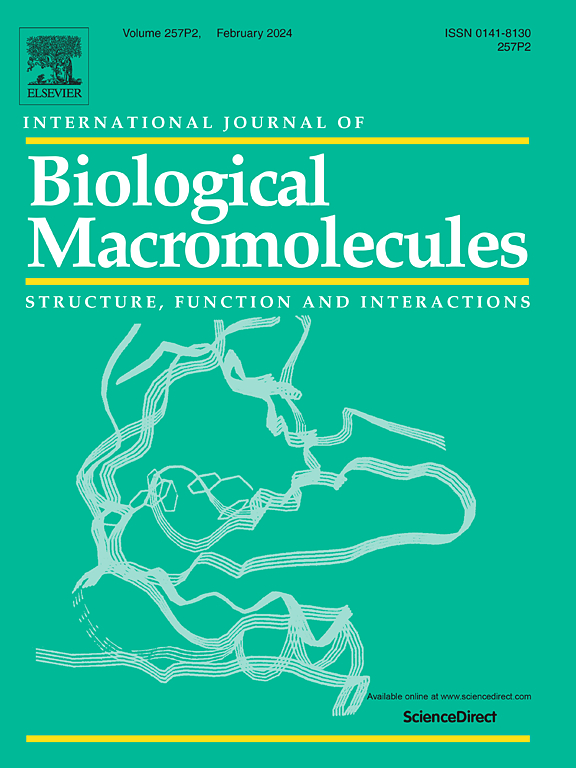基于豌豆蛋白水凝胶和米糠蜡油凝胶的新型 bigel 的开发与表征:提高流变特性和冻融稳定性。
IF 7.7
1区 化学
Q1 BIOCHEMISTRY & MOLECULAR BIOLOGY
International Journal of Biological Macromolecules
Pub Date : 2024-10-15
DOI:10.1016/j.ijbiomac.2024.136606
引用次数: 0
摘要
本研究开发了一种新型豌豆蛋白(PP)基 bigel,其特点是具有高内相乳液。研究了胶凝剂浓度对 bigel 的凝胶特性和冻融稳定性的影响。这种 bigel 由两种不同的凝胶相组成:一种是由 PP 和转谷氨酰胺酶(TGase)形成共价网络的水相凝胶,另一种是由米糠蜡(RBW)形成晶体网络结构的油相凝胶。微观结构分析表明,大凝胶具有双连续网络结构,网络密度随着 TGase 和 RBW 浓度的增加而增加。流变学分析表明,随着 TGase 和 RBW 浓度的增加,bigel 的储存模量(G')、表观粘度和结构恢复能力也随之增加。温度扫描实验证实,即使在高温条件下,bigel 仍能保持其弹性固体特性。当 TGase 浓度为 0.4 %、RBW 浓度为 7 % 时,bigel 的感官特性达到最佳,摩擦系数也较低。此外,当 TGase 和 RBW 浓度分别超过 0.2 % 和 5 % 时,bigel 表现出显著的冻融稳定性。这些发现凸显了基于 PP-RBW 的 bigel 卓越的凝胶特性和稳定性,表明它有潜力成为食品工业中的脂肪替代品。本文章由计算机程序翻译,如有差异,请以英文原文为准。
Development and characterisation of a novel bigel based on pea protein hydrogel and rice bran wax oleogel: Enhancement of rheological properties and freeze-thaw stability
In this study, a novel pea protein (PP)-based bigel was developed, featuring a high internal phase emulsion. The impact of gelling agent concentration on the gel properties and freeze-thaw stability of the bigel was investigated. The bigel was comprised of two distinct gel phases: an aqueous-phase gel with a covalent network formed by PP and transglutaminase (TGase), and an oil-phase gel with a crystal network structure of rice bran wax (RBW). Microstructural analysis revealed a bi-continuous network structure in the bigel, with network density increasing as TGase and RBW concentrations rose. Rheological analysis showed that storage modulus (G′), apparent viscosity, and structural recovery of the bigel increased with higher TGase and RBW concentrations. Temperature scanning experiments confirmed that the bigel maintained its elastic solid behavior even at elevated temperatures. Optimal sensory properties and low coefficient of friction were achieved at 0.4 % TGase and 7 % RBW concentrations. Additionally, the bigel exhibited notable freeze-thaw stability at TGase and RBW concentrations exceeding 0.2 % and 5 %, respectively. These findings highlight the excellent gelation properties and stability of the PP-RBW-based bigel, suggesting its potential as a fat substitute in the food industry.
求助全文
通过发布文献求助,成功后即可免费获取论文全文。
去求助
来源期刊
CiteScore
13.70
自引率
9.80%
发文量
2728
审稿时长
64 days
期刊介绍:
The International Journal of Biological Macromolecules is a well-established international journal dedicated to research on the chemical and biological aspects of natural macromolecules. Focusing on proteins, macromolecular carbohydrates, glycoproteins, proteoglycans, lignins, biological poly-acids, and nucleic acids, the journal presents the latest findings in molecular structure, properties, biological activities, interactions, modifications, and functional properties. Papers must offer new and novel insights, encompassing related model systems, structural conformational studies, theoretical developments, and analytical techniques. Each paper is required to primarily focus on at least one named biological macromolecule, reflected in the title, abstract, and text.

 求助内容:
求助内容: 应助结果提醒方式:
应助结果提醒方式:


